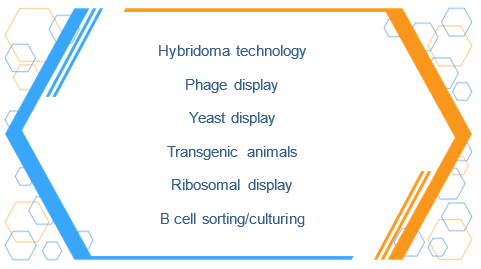Most of the immune checkpoint inhibitors applied in disease therapies up to date are monoclonal antibodies. This fact has shown us how important monoclonal antibodies are in immune checkpoint researches and progress. Creative Biolabs has been committed to antibody development for over 10 years. We have gradually established our own technology platforms during a long time of exploration and growth. We have accomplished hundreds of customer-satisfied monoclonal antibody development projects.
T-cell priming/activation is tightly regulated by costimulatory or coinhibitory signals known as immune checkpoints. Under normal physiologic conditions, immune checkpoints inhibit immune responses against self-antigens, thereby preventing unwanted autoimmunity. However, these inhibitory pathways are upregulated in many cancers and play critical roles in cancer-associated immune suppression and immune evasion. Several immune checkpoint inhibitor monoclonal antibodies, such as anti-CTLA-4, anti-PD-1, are marketed to treat many types of cancers.

Hybridoma technology is the standard method to generate monoclonal antibodies. The spleen cells are isolated and fused with myeloma cells to obtain hybridomas. After fusion, cells undergo a selection step based on the hypoxanthine-guanine-phosphoribosyl-transferase (HGPRT) deficiency of myeloma cells. By adding aminopterine or azaserine to the culture media, the unfused myeloma cells die due to the HGPRT deficiency and the lack of use of the salvage pathway for purine synthesis. B lymphocytes provide this ability, and only fused cells can use this alternative way to survive.
Phage display antibody libraries are an alternative tool for the isolation of mAbs. This technology involves creating a sizeable combinational pairing of variable heavy and light chain antibody repertoire and their expression on the phage surface infusion with one of its coat proteins. A number of antibodies can be identified from a single library and be further expressed and produced in a prokaryotic expression system. Phage display technology physically links the antibody genotype and phenotype on a single phage particle. Due to the robust nature and high stability of phage, this technology has gained advantages over the other technologies.
Another advanced technology platform for isolation of mAbs is from memory B cells: either by sorting or culturing single/Bulk B cell(s), by which many mAbs have been produced. The difficulty in adopting such high throughput technology is that it requires very high-end instrumentation and expertise (like flow sorters, Next Generation Sequencer (NGS), and robotic screening systems for screening of cultured memory B cells).
Creative Biolabs is an industry-leading antibody development service provider with excellent infrastructure and technology platforms to fulfill all of our customers' requirements. Our experts specializing in antibody development will spare no effort to help with every detail during the project. Besides high-quality custom immune checkpoint monoclonal antibody development services, Creative Biolabs also provides other relevant services, including downstream services.
As a global leading antibody researcher and relevant service provider, Creative Biolabs is confident in bringing every client top-rated customer experience and will try our best to meet every client's detailed requirements. If you are interested in immune checkpoint monoclonal antibody development services or any other services on our website, please feel free to contact us for more information.
All listed customized services & products are for research use only, not intended for pharmaceutical, diagnostic, therapeutic, or any in vivo human use.
USA
Tel:
Fax:
Email:
Copyright © 2026 Creative Biolabs. All Rights Reserved.